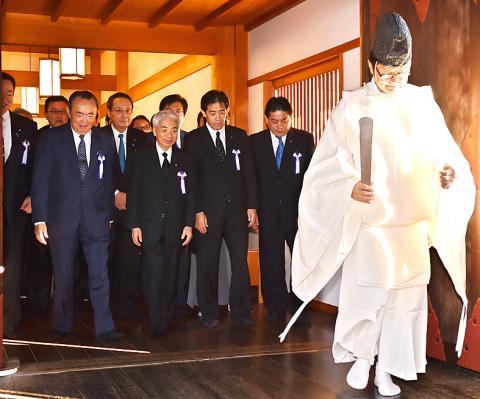Japanese Prime Minister Shinzo Abe sent a ritual offering to Tokyo’s Yasukuni Shrine yesterday, prompting sharp rebukes from China and South Korea, even as Abe seeks meetings with their leaders to improve strained ties.
The shrine, which honors 30,304 Taiwanese who died in World War II among 2.5 million other war dead, is seen by critics such as China and South Korea as a symbol of Japan’s past militarism, because it honors wartime leaders convicted by an Allied tribunal as war criminals, along with millions of war dead.
A group of Japanese lawmakers paid their respects at the shrine yesterday, the beginning of an autumn festival, while Abe sent a small masakaki tree, witnesses said.

Photo: AFP
There was no sign of Cabinet ministers, although NHK public television said Japanese Minister of Health Yasuhisa Shiozaki sent an offering. A ruling party lawmaker tweeted that three ministers planned to visit today.
China expressed “serious concern” after Abe’s offering.
“China reiterates that only by Japan earnestly and squarely facing, deeply reflecting upon its history of invasion and clearly distancing itself from militarism, can China-Japan relations realize healthy and stable development,” Chinese Ministry of Foreign Affairs spokesman Hong Lei (洪磊) said in a statement.
South Korea said it deplored Abe’s offering to the shrine, which it called “the symbol of glorification of Japan’s colonization and invasive war.”
“Japan should move forward to a bright future based on serious reflection on the past, not locking itself in the dark past,” a South Korean Ministry of Foreign Affairs spokesman said.
Expectations have been growing that Abe will be able to meet Xi for icebreaking talks next month at an APEC summit in Beijing.

Tropical Storm Gaemi strengthened into a typhoon at 2pm yesterday, and could make landfall in Yilan County tomorrow, the Central Weather Administration (CWA) said yesterday. The agency was scheduled to issue a sea warning at 11:30pm yesterday, and could issue a land warning later today. Gaemi was moving north-northwest at 4kph, carrying maximum sustained winds near its center of up to 118.8kph and gusts of 154.8kph. The circumference is forecast to reach eastern Taiwan tomorrow morning, with the center making landfall in Yilan County later that night before departing from the north coast, CWA weather forecaster Kuan Shin-ping (官欣平) said yesterday. Uncertainty remains and

SEA WARNING LIKELY: The storm, named Gaemi, could become a moderate typhoon on Wednesday or Thursday, with the Taipei City Government preparing for flooding A tropical depression east of the Philippines developed into a tropical storm named Gaemi at 2pm yesterday, and was moving toward eastern Taiwan, the Central Weather Administration (CWA) said. Gaemi could begin to affect Taiwan proper on Tuesday, lasting until Friday, and could develop into a moderate typhoon on Wednesday or Thursday, it said. A sea warning for Gaemi could be issued as early as Tuesday morning, it added. Gaemi, the third tropical storm in the Pacific Ocean this typhoon season, is projected to begin moving northwest today, and be closest to Taiwan on Wednesday or Thursday, the agency said. Today, there would likely

DISRUPTIONS: The high-speed rail is to operate as normal, while several airlines either canceled flights or announced early departures or late arrivals Schools and offices in 15 cities and counties are to be closed today due to Typhoon Gaemi, local governments announced last night. The 15 are: Taipei, New Taipei City, Taoyuan, Tainan, Keelung, Hsinchu and Kaohsiung, as well as Yilan, Hualien, Hsinchu, Miaoli, Chiayi, Pingtung, Penghu and Lienchiang counties. People should brace for torrential rainfall brought by the storm, with its center forecast to make landfall on the east coast between tonight and tomorrow morning, the Central Weather Administration (CWA) said. The agency issued a sea warning for the typhoon at 11:30pm on Monday, followed by a land warning at 11:30am yesterday. As of

CASUALTY: A 70-year-old woman was killed by a falling tree in Kaohsiung as the premier warned all government agencies to remain on high alert for the next 24 hours Schools and offices nationwide are to be closed for a second day today as Typhoon Gaemi crosses over the nation, bringing torrential rain and whipping winds. Gaemi was forecast to make landfall late last night. From Tuesday night, its outer band brought substantial rainfall and strong winds to the nation. As of 6:15pm last night, the typhoon’s center was 20km southeast of Hualien County, Central Weather Administration (CWA) data showed. It was moving at 19kph and had a radius of 250km. As of 3pm yesterday, one woman had died, while 58 people were injured, the Central Emergency Operation Center said. The 70-year-old